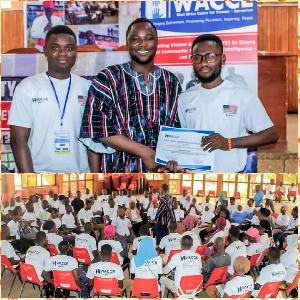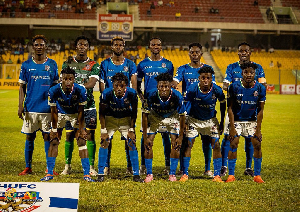Mr Mutaru Mumuni Muqthar, the Executive Director of the West Africa Centre for Counter-Extremism (WACCE), has urged government to do more in the prevention, spread of radicalization and violent extremism amongst the youth in Ghana.
He said the pervasive vulnerabilities such as the high number of unresolved chieftaincy conflicts, political vigilantism, violence and the uncompromising political environment during political seasons can affect Ghana in a manner that could change the country’s security profile forever.
“High youth unemployment also have a tendency to serve as a conveyor belt to large-scale violence and terrorism”.
Mr Muqthar was speaking at the close of a two-day capacity building workshop on Preventing Violent Extremism (PVE) in Ghana organised by WACCE at Bolgatanga in the Upper East Regional
The workshop which was organized with the support of the US Embassy was intended to deepen the understanding of the local community, youth and youth leaders, especially vulnerable communities on the threat of radicalization and its drivers.
It was also on how the youth can play an active role in preserving peace in their communities.
The workshop also focused on youth self-development and how to legitimately realize their economic and social aspirations whilst contributing to positive social change.
He stressed that all nations, organizations and individuals who are committed to global peace have agreed that sustainable peace could not be achieved without successes against radicalization and violent extremism.
According to Mr Muqthar, this was in line and in support of the Sustainable Development Goals (SDG) 16 as well as in furtherance of the United Nations Security Council Resolution 2250 (2015) which recognises the crucial role of the youth in building sustainable peace".
He said the United Nations SDG 16 acknowledges violent extremism as a pervasive threat to global peace, and that its deadly sophistication requires a concerted action beyond law enforcement, military or security measures.
“It requires a non-security approach involving the civilian population.
“What will be remarkable is how young people themselves decide to address this challenge”.
The WACCE Executive Director reveals that the biggest challenge Ghana faces was the youth vulnerability and the inability of the state to create adequate jobs or inspire the creation of adequate businesses in the private sector to absorb them.
He said this exposes the youth to serious vulnerabilities with consequential impact on the country.
Mr Muqthar revealed that in WACCE’s 2018 research report on local security threats, the organization noted that chieftaincy and ethnic violence remains the single most pervasive source of insecurity and fatality with over 352 unresolved conflicts currently nationwide.
“Between 1981 to 2018, a chieftaincy and ethnic conflicts have claimed more than 12,700 lives. Of course, this statistic is largely skewed by the 1994 Nanumba-Konkomba war”.
Ms Matilda Ahadzi, a participant and member of the Catholic Women's Association in Bolgatanga, expressed her joy and satisfaction on the interactive and practical nature of the workshop.
Mr Abdul Rahman Safian, a facilitator explained that this workshop could not have come at a better time than now, given the high level of youth unemployment, unresolved local conflicts and the vulnerable nature of the youth.
Participants were trained as Peace Ambassadors to see themselves as change makers, peer educators and leaders with a commitment to ensuring sustainable peace.
The workshop was held to conclude WACCE 2018 PVE Campaign in Ghana.
WACCE in 2018 organized five workshops in Accra, Tamale and Bolgatanga to train over 500 youth on Preventing and Countering Violent Extremism and Radicalization in Ghana.
General News of Sunday, 6 January 2019
Source: ghananewsagency.org













